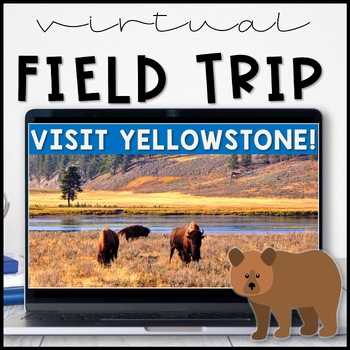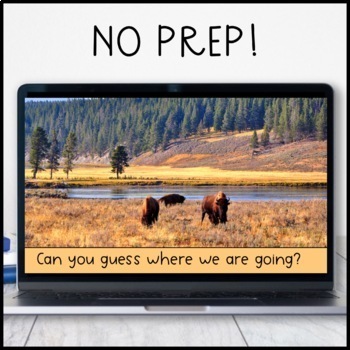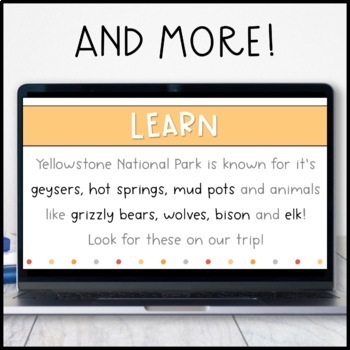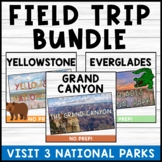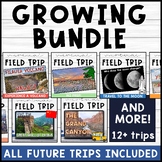Virtual Field Trip Yellowstone National Park in the Spring
- PPTX
What educators are saying
Also included in
- EVERY PRODUCT, EVER!Includes all current products AND any future uploads! Grab it now at the lowest price!! Bundle price will increase each time a new product is added to my store.My products are suitable for K - 5th students!⭐️NEW⭐️ MEMPHIS, TN MLK Virtual Field Trip added 1/28/2024⭐️NEW⭐️ Monthly MemoPrice $47.00Original Price $67.63Save $20.63
- ★ 3 Virtual Field Trips! National Park Edition ★Visit Grand Canyon, Yellowstone and Everglades National Park!Virtual Field Trips are an engaging activity, no matter the format of instruction, your students will be engaged! Use them as a preview to any science unit OR have the class work towards thePrice $8.00Original Price $10.98Save $2.98
- ULTIMATE Virtual Field Trip *Growing* Bundle!12 trips and GROWING! This product will include all my future elementary field trips! Grab it now at the lowest price!! Bundle price will increase when new trips are added.⭐️NEW⭐️ MEMPHIS, TN Dr. MLK Jr. added 1/28/2024⭐️NEW⭐️ THE GREAT WALL OF CHINA added 5/Price $35.00Original Price $47.88Save $12.88
Description
Virtual Field Trip to Yellowstone!
Visit America's first national park!
NO PREP! Just 'share your screen' and present the slides & videos. ☺
Trip is designed for grade K - 5, easy to differentiate based on how many videos you play.
GREAT FOR: socially distanced learning, science and social studies supplemental lesson, NO PREP sub plans or as a Fun Friday/Field Trip Friday classroom reward to work towards!!
W H A T ' S I N C L U D E D ?
⭐️ Teacher directions
⭐️ PowerPoint & Google Slides included (PowerPoint file with a link to "make a copy" for Google Slides format)
⭐️ Prediction pictures!
⭐️ Anticipatory set & questions
⭐️ Fun facts about Yellowstone
⭐️ Link to a virtual driving tour of Yellowstone
⭐️ Links to videos about some of Yellowstone's most famous features!
AND MORE!
Truly an EXPERIENCE through your screen, your kiddos will love this trip!
FAQ: How long are the trips? With my third graders, my virtual field trips last anywhere from 30 - 60 minutes! You can adapt the length and number of videos shown based on your grade level.
You may also like:
Virtual Field Trip | Visit the Moon!
Virtual Field Trip | GRAND CANYON
Seasonal Would You Rather Questions
✰ Please email me if you have any questions about this product! teachortravel1@gmail.com ✰
Let's connect! Follow me on Pinterest and TeacherPayTeachers ☺

